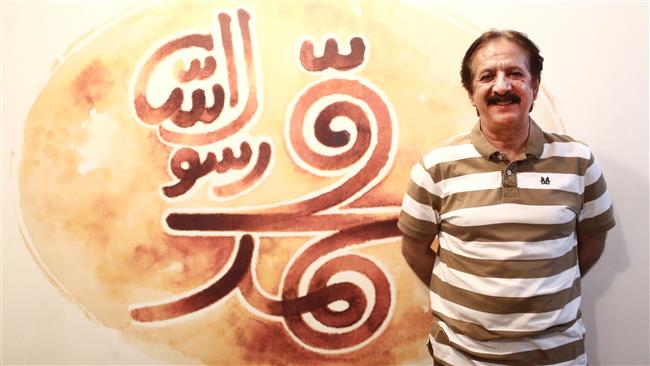December 25, 2015

The film “Muhammad: Messenger of God” will go into general release in theaters outside Iran for the first time later this month. But only in Turkey.
The movie seems to be facing major resistance around the world—in the Islamic countries because it is being tabbed as Shiite propaganda, and elsewhere because it is billed as an Iranian religious film and is therefore widely seen as propaganda.

But Turkey has agreed to screen the film and it will open in theaters across that country starting December 29, the Tasnim news agency reported. The director, Majid Majidi, earlier said it would be seen in 430 theaters across Turkey, a large number.
The film was shown twice at a film festival in Canada in August and twice last month in Stockholm. It also was screened over one weekend in Copenhagen, Majidi said. And it was also shown at a major Beirut theater November 5 to an invited audience and once to an invited audience in Hollywood by the American Film Institute. But it has not yet had general release outside Iran.
Majidi said a few months ago that it is set to be screened across Iraq, Lebanon and Syria—the first two having large Shiite populations and the last being allied to Iran. But it hasn’t opened yet in those countries, probably because the Arabic version isn’t finished yet.
There has been no word yet of any North American release. Iranian films have long been popular in art theaters across North America. But “Muhammad” may not appeal to the bookers at art theaters.
Majidi was in Sweden for the recent screening there, where he vented his spleen: “Unfortunately, those who propagate extremist and violence-seeking ideologies have banned the movie without even watching it.”
He didn’t say whom he was aiming at, but the terminology he used is commonly used in Iran to refer to Saudi Arabia.
The earliest and most vocal opposition to his film has come from the Al-Azhar seminary in Cairo, the intellectual center of Sunni Islam.
But Saudi Arabia’s senior cleric, Grand Mufti Abdul-Aziz Al-Shaikh, slammed it as “an obscene work,… a distortion of Islam.” He also attacked Majidi personally, saying, “Those behind it are not trustworthy and rely on lies. They are not honest.” The Mecca-based Muslim World League also condemned the film, saying any portrayal of the Prophet is prohibited.
The Prophet’s face is never shown in the film, just his hands and the back of his body, sometimes just his shadow.
The film premiered in Iran August 26 and was shown in theaters all across the country in the following weeks. Many theaters were packed, but Al-Monitor said the film was being seen in Iran as a box office failure because ticket sales came nowhere near recouping costs, which are now put at around $40 million, a record for Iran.
It has gotten good reviews and extensive coverage in the conservative media. On the other hand, the Reformist daily Sharq asked, “Why did Majidi’s film not turn out to be what it should have been?” — describing the film as weak in terms of character, story development and casting.
Film critic Masud Farasati also panned the film, calling it “bad, defaced and very vague.”
An Al-Monitor reporter approached moviegoers in Mashhad who had just seen the film. Alaleh told Al-Monitor that she was bored. “The film really got on my nerves. I wanted to leave the cinema several times, but thought it would be rude. I was really bored. What’s the point of spending three hours on the prophet’s childhood when nothing dramatic happened in those years?”
Of around 10 moviegoers in Mashhad who spoke to Al-Monitor, not a single one described it as a masterpiece or a production that would be remembered.
Al-Monitor speculated that might be because of the Iranian public’s love for Moustapha al-Akkad’s 1970s’ classic “The Prophet,” which is broadcast on Iranian TV at least once a year on a religious holiday.
“Akkad’s film is a collective memory we Iranians share. We expected Majidi to create a new cinematic memory of the Prophet for us, especially with all the money he has spent on this film,” Mohammad, an architect, told Al-Monitor. He added, “There was nothing of the prophet’s wars or his conquest of the holy city of Mecca or any other notable thing in the film.” Indeed, the film merely depicts the first 13 years of the Prophet’s life.
Ticket sales are reported as unprecedented in the history of the Iranian cinema. In its first two months, the film grossed a record 90 billion rials ($2.5 million). But that has to be compared to the published cost of $40 million.
One film critic in Tehran told Al-Monitor, “It should be noted that the Iranian comedy ‘Nahang-e Anbar’ [‘Sperm Whale’], which was produced with a maximum budget of 4-5 billion rials [$110,000-$140,000] also earned 60 billion rials [$1.7 million] last month. We shouldn’t forget that Majidi’s film has been greatly advertised across the city and on the state broadcaster. Close to 200 theaters, or 186 to be exact, are showing this film. That’s about the same as the total number of theaters for all other films that are being shown now. Also the tickets for this film were 70 percent more expensive than that of other films in Tehran.”
Meanwhile, the film is facing a different kind of assault in India, where Sunni clerics at the Raza Academy have issued a fatva against not only Majidi, but also A. R. Rahman, who composed the music for the film. Rahman was born Hindu and converted to Islam. He won an Academy Award in 2009 for his music for the film “Slumdog Millionaire.”
The Raza Academy called on the Indian government to ban the film. It also added a new criticism, saying the film should never have used the name “Muhammad” in the title because criticism of the film might then be seen as criticism of the Prophet.
The Raza Academy ordered Rahman to reaffirm his faith by reciting the tenets of Muslim belief and repeating his marriage vows.
The Raza Academy’s general secretary, Saeed Noori, told the Times of India that neither he nor Mufti Mahmood Akhatrul Qadri, who wrote the fatva, had seen the film.
